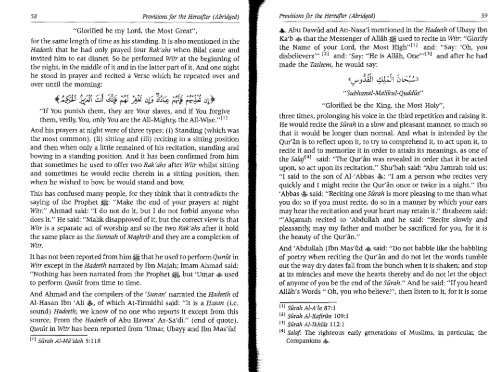Provisions for the Hereafter (Zaad Al-Ma'ad)
Provisions for the Hereafter (Zaad Al-Ma'ad)
Provisions for the Hereafter (Zaad Al-Ma'ad)
You also want an ePaper? Increase the reach of your titles
YUMPU automatically turns print PDFs into web optimized ePapers that Google loves.
58 <strong>Provisions</strong> <strong>for</strong> <strong>the</strong> <strong>Hereafter</strong> (Abridged)<br />
"Glorified be my Lord, <strong>the</strong> Most Great",<br />
<strong>for</strong> <strong>the</strong> same length of time as his standing. It is also mentioned in <strong>the</strong><br />
Hadeeth that he had only prayed four Rak'ahs when Bilal came and<br />
invited him to eat dinner. So he per<strong>for</strong>med Witr at <strong>the</strong> beginning of<br />
<strong>the</strong> night, in <strong>the</strong> middle of it and in <strong>the</strong> latter part of it. And one night<br />
he stood in prayer and recited a Verse which he repeated over and<br />
over until <strong>the</strong> morning:<br />
Sdely Vf,:: rAC:i •••4<br />
gaji`-sar<br />
"If You punish <strong>the</strong>m, <strong>the</strong>y are Your slaves, and if You <strong>for</strong>give<br />
<strong>the</strong>m, verily, You, only You are <strong>the</strong> <strong>Al</strong>l-Mighty, <strong>the</strong> <strong>Al</strong>l-Wise." [11<br />
And his prayers at night were of three types: (i) Standing (which was<br />
<strong>the</strong> most common), (ii) sitting and (iii) reciting in a sitting position<br />
and <strong>the</strong>n when only a little remained of his recitation, standing and<br />
bowing in a standing position. And it has been confirmed from him<br />
that sometimes he used to offer two Rak'ahs after Witr whilst sitting<br />
and sometimes he would recite <strong>the</strong>rein in a sitting position, <strong>the</strong>n<br />
when he wished to bow, he would stand and bow<br />
This has confused many people, <strong>for</strong> <strong>the</strong>y think that it contradicts <strong>the</strong><br />
saying of <strong>the</strong> Prophet "Make <strong>the</strong> end of your prayers at night<br />
Witr." Ahmad said: "I do not do it, but I do not <strong>for</strong>bid anyone who<br />
does it." He said: "Malik disapproved of it, but <strong>the</strong> correct view is that<br />
Witr is a separate act of worship and so <strong>the</strong> two Rak'ahs after it hold<br />
<strong>the</strong> same place as <strong>the</strong> Sunnah of Maghrib and <strong>the</strong>y are a completion of<br />
Witr.<br />
It has not been reported from him that he used to per<strong>for</strong>m Qunat in<br />
Witr except in <strong>the</strong> Hadeeth narrated by Ibn Majah; Imam Ahmad said:<br />
"Nothing has been narrated from <strong>the</strong> Prophet g, but 'Umar 4 used<br />
to per<strong>for</strong>m Qurtat from time to time.<br />
And Ahmad and <strong>the</strong> compilers of <strong>the</strong> 'Sunan' narrated <strong>the</strong> Hadeeth of<br />
<strong>Al</strong>-Hasan Ibn '<strong>Al</strong>i 4, of which At-Tirmidhi said: "It is a Hasan (i.e.<br />
sound) Hadeeth; we know of no one who reports it except from this<br />
source, From <strong>the</strong> Hadeeth of Abu Hawra' As-Sa'di." (end of quote).<br />
Qunla in Witr has been reported from 'Umar, Ubayy and Ibn Mastd<br />
[11 Sarah <strong>Al</strong>-Mtitidah 5:118<br />
<strong>Provisions</strong> <strong>for</strong> <strong>the</strong> <strong>Hereafter</strong> (Abridged) 59<br />
Abu Dawnd and An-Nasa'i mentioned in <strong>the</strong> Hadeeth of Ubayy Ibn<br />
Ka'b 4 that <strong>the</strong> Messenger of <strong>Al</strong>lah used to recite in Witr: "Glorify<br />
<strong>the</strong> Name of your Lord, <strong>the</strong> Most High" [11 and: "Say: 'Oh, you<br />
disbelievers"' [21 and: 'Say: "He is <strong>Al</strong>lah, One"' 131 and after he had<br />
made <strong>the</strong> Tasleem, he would say:<br />
k Sel (131,Z.3:4»<br />
"Subhanal-Malikul-Quddits"<br />
"Glorified be <strong>the</strong> King, <strong>the</strong> Most Holy",<br />
three times, prolonging his voice in <strong>the</strong> third repetition and raising it.<br />
He would recite <strong>the</strong> Sitrah in a slow and pleasant manner, so much so<br />
that it would be longer than normal. And what is intended by <strong>the</strong><br />
Qur'an is to reflect upon it, to try to comprehend it, to act upon it, to<br />
recite it and to memorize it in order to attain its meanings, as one of<br />
<strong>the</strong> Sala/ 41 said: "The Qur'an was revealed in order that it be acted<br />
upon, so act upon its recitation." Shu'bah said: "Abu Jamrah told us:<br />
"I said to <strong>the</strong> son of <strong>Al</strong>-'Abbas 4: "I am a person who recites very<br />
quickly and I might recite <strong>the</strong> Qur'an once or twice in a night." Ibn<br />
'Abbas said "Reciting one Sarah is more pleasing to me than what<br />
you do; so if you must recite, do so in a manner by which your ears<br />
may hear <strong>the</strong> recitation and your heart may retain it." Ibraheem said:<br />
"'<strong>Al</strong>qamah recited to 'Abdullah and he said: "Recite slowly and<br />
pleasantly, may my fa<strong>the</strong>r and mo<strong>the</strong>r be sacrificed <strong>for</strong> you, <strong>for</strong> it is<br />
<strong>the</strong> beauty of <strong>the</strong> Qur'an."<br />
And 'Abdullah (Ibn Mastd 4 said: "Do not babble like <strong>the</strong> babbling<br />
of poetry when reciting <strong>the</strong> Qur'an and do not let <strong>the</strong> words tumble<br />
out <strong>the</strong> way dry dates fall from <strong>the</strong> bunch when it is shaken; and stop<br />
at its miracles and move <strong>the</strong> hearts <strong>the</strong>reby and do not let <strong>the</strong> object<br />
of anyone of you be <strong>the</strong> end of <strong>the</strong> Sarah." And he said. "If you heard<br />
<strong>Al</strong>lah's Words " Oh, you who believe!", <strong>the</strong>n listen to it, <strong>for</strong> it is some<br />
Sarah <strong>Al</strong>-<strong>Al</strong>la 87:1<br />
12] Sarah <strong>Al</strong>-Kafiri/in 109:1<br />
131 Sarah <strong>Al</strong>-Ikhlas 112:1<br />
141 Sale The righteous early generations of Muslims, in particular, <strong>the</strong><br />
Companions 4.

















